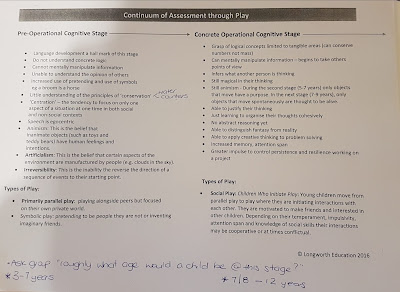What is going on for my learners...
STATS
Ethnicity
12 NZE
6 Maori
1 Cook Island Maori
1 African
Gender
14 boys
6 girls
Health
1 Type 1 Diabetic child
1 child on RTLB roll - diagnosed FASD ad ADHD (medicated with rhetolin).
1 child on SLT roll (Term 1 only) - diagnosed as being globally delayed
1 child with health needs that results in absence from school
1 child with significant changes happening in the home.
All children labelled as Year 2 - 1 child who started school at age 6.
DEVELOPMENTALLY
Pre-operational learners in Room 5. Many children are enjoying the soothing and calming nature of the sensorimotor activities but fit into Piaget's developmental stage of pre-operational.
How do I know?
Observations of the children in play during the first 6 weeks of school showed that they were all firmly in the pre-operational cognitive stage using the indicators above. Evidence was collected:
Louie, Mathew and Harry are using props/symbols in replacement of actual items for their play. This is showing increased ability in pretend play.
Harley and Eli substituted sand with a yellow piece of fabric.
Eli has created a security camera out of substituted goods.
When working on capacity; Ozzy, Laycee, Harley, Holden, Edan and Cora-Lee all identified taller vessels as being capable of holding the most amount of water. Therefore showing an irreversibility factor.
When sitting back and watching play, it was obvious that the children were needing coaching around different ways to solve a problem with our peers. The children are all ego-centric and unable to see the points of view of others. As a result, children were resulting to hitting or yelling to solve problems. Daily modelling sessions for solving problems was introduced at brainfood time (or just before) and a variety of resources are used. Puppets, Sesame St clips and picture books to name a few. Role playing scenarios is highly enjoyable - making sure to always have the children be the 'good guy' as per IY guidelines.
CURRICULUM
How do I know?
Using last year's pass-on data and my Term 1 testing, I was able to set up tracking sheets for JAM and Running Record testing.
After moderating and reflecting on the student's writing, I noticed the following behaviours throughout Term 1:
- Children will write with teacher but uninterested in writing independently.
- Children enjoyed writing own choice stories the most.
- Two most capable independent readers (NZ European girls) were lacking vocab in written language.
- Not a high mileage for writing happening in Room 5 in first 6 weeks of the year.
- My first observation of the year reflected that my team leader wanting a focus on handwriting in my daily programme to help my students write longer pieces and quicker (with more ease).
- National Standards data and SOL (student ownership of learning) is the focused pass-on data received so unsure of wider curriculum understandings and efficacies.
PLAY
Urges
How do I know?
Observations of the children in play during the first 8 weeks of school showed that the major urges that children were exhibiting were/are:
Enclosure
Construction
Orientation
Deconstruction
STUDENT VOICE
What stuff do we do in class that is learning?
03.03.18
I asked the children this simple question and plugged the answers that the children gave me into Wordle. The children could have as few or as many answers as they liked. They couldn't see or hear the answers that previously children gave. All children answered the question.











